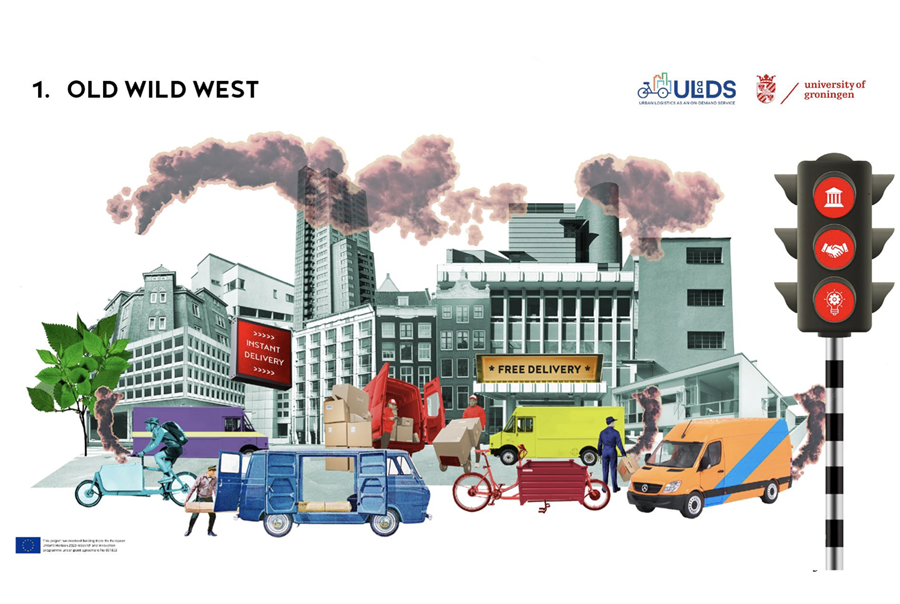The future of parcel delivery in European cities. Cleaner and smarter, or none of that?

We have our packages, groceries and meals delivered at home en masse. These online orders mean more vans, trucks and bicycle couriers. In city centers, this increase leads to unsafe situations and air pollution. Paul Buijs (Faculty of Economics and Business), Ward Rauws and Paul Plazier (Faculty of Spatial Sciences) of the University of Groningen investigated how this situation could be improved. What does it take to get goods in and out of the city in a cleaner and smarter way, now and in the future? They asked transporters, entrepreneurs and policy makers how they envision the future of logistics in the city. This resulted in six future scenarios for the year 2035.
The number of home deliveries worldwide is expected to increase by another 78% by 2030 (World Economic Forum, 2020). More and more stakeholders therefore see the need to make logistics more sustainable. However, this is easier said than done. The many stakeholders (transporters, policy makers, local entrepreneurs, residents) have diverse interests, wishes and requirements. Moreover, technological developments, global crises and changing consumer behaviour create great unpredictability, which can make today's actions obsolete tomorrow.
Scenarios for possible futures
Nevertheless, policymakers, transporters and recipients make choices every day that determine the sustainability of logistics. The six scenarios produced by this study help to better substantiate these choices. The researchers asked a broad group of logistics stakeholders about their expectations and wishes for the future. Three themes were central: the cooperation between logistics stakeholders, the degree of technological innovation, and the role of local authorities.
Sustainability difficult to achieve
In none of the scenarios the growth of e-commerce is expected to stagnate. Neither are logistics activities expected to be banned from the city. Logistics changes, but remains part of the city. This emphasizes the importance of making the sector more sustainable.
However, sustainable city logistics are only achieved in two of the six scenarios. In other scenarios, the transition is not (or only partly) made due to a lack of clear policy from governments, poor cooperation and a lack of innovations contributing to sustainability.
An important condition for better cooperation between all parties is a clear vision and policy from municipalities. It is up to shippers to provide smarter and cleaner transport on the street with innovative solutions. Consumer ordering behavior and pressure from public opinion can also be important incentives for making logistics more sustainable.
The scenarios are summarized in text and image in the booklet “What's in store for last-mile logistics: Futures scenarios for last-mile logistics in mid-size European cities”. Dutch version / English version
ULaaDS project
This research was carried out within the ULaaDS (Urban Logistics as an on-Demand Service) project and was funded by the Horizon 2020 research and innovation program of the European Union. More information at www.ulaads.eu
More news
-
09 December 2025
Are robots the solution?
-
01 December 2025
The power of movement
